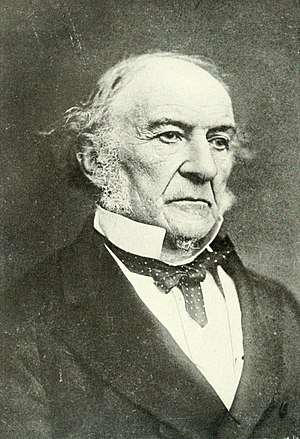William Gladstone

William Ewart Gladstone was a British Liberal Party statesman and four times Prime Minister of the United Kingdom (1868–74, 1880–85, 1886 and 1892-94). He was known as G.O.M. which to most people used to stand for Grand Old Man but his long term rival Benjamin Disraeli always said stood for God's Only Mistake. He was a champion of Home Rule for Ireland. When Disraeli died Gladstone proposed a state funeral (to make political capital on his rival's death) but Disraeli's will stipulated other arrangements. To this Gladstone replied, "As Disraeli lived, so he died -- all display, without reality or genuineness."
He was also on bad terms with Queen Victoria, in part because she liked Disraeli so much. She once complained, "He always addresses me as if I was a public meeting". (Technically, gramatically correct, but nowadays "were a public meeting" would be more common.)
Winston Churchill cited Gladstone as his inspiration.
Prior to becoming PM, he had initially been a Conservative, before joining the Peelite faction that merged with the Whigs and Radicals to become the Liberal Party. He had served as a junior minister under Peel, and as Chancellor of the Exchequer under The Earl of Aberdeen (during whose premiership Gladstone delivered the longest-ever Budget speech, clocking in at four hours, 45 minutes),[1] The Viscount Palmerston (with whom he was constantly at loggerheads), and Earl Russell. Noted for his skill as a financial administrator, he would be his own Chancellor several times after becoming PM.
In his first premiership Gladstone reformed the Civil Service, Army and local government to make individual advancement easier and fairer, among other things abolishing the sale of commissions. In foreign affairs his overriding aim was to promote peace and understanding. When he lost the election he gave up the leadership.
Then in 1880 the Liberals won again, and the new Liberal leader Lord Hartington, retired in Gladstone's favour. Gladstone won two seats in this election so had to give one up. Queen Victoria did infact ask Hartington to form a ministry but was convinced to send for Gladstone. Gladstone had opposed himself to the "Colonial hobby" pushing for the scramble for Africa. He thus saw the end of the Second Anglo-Afghan War, First Boer War and the war against the Mahdi in Sudan, but was unable to end the war with Egypt. In practice the empire actually expanded significantly under his premiership.
In 1886 Gladstone's party allied with Irish Nationalists to defeat Lord Salisbury's government. Gladstone regained his position as PM and combined the office with that of Lord Privy Seal. Then he introduced The Home Rule Bill for Ireland. The issue split his party and thus killed his government.
The general election of 1892 resulted in a minority Liberal government, with Gladstone as Prime Minister for the fourth and final time. Gladstone, at the age of 82, was both the oldest ever person to be appointed Prime Minister and when he resigned in 1894 aged 84 he was the oldest person ever to occupy the Premiership. In his address he promised Home Rule and the disestablishment of the Scottish and Welsh Churches, but failed. (The Welsh Church was disestablished after his death; the Scottish Church remains established to this day, with result that the Queen is the "Supreme Governor" of two subtly different Christian denominations on either side the border.) The Home Rule was killed by The House of Lords and legislation about the churches never even got onto the table. He started to gain opposition in both the actual opposition and his own party, he so resigned as Prime Minister.
In a final slight against her least favorite Prime Minister, Queen Victoria did not ask him who would succeed him as Prime Minister and sent for Lord Rosebery, Gladstone wanted Lord Spencer. He retained his seat in the Commons until 1895.
And finally, aside from his considerable oratorical talents the other thing Gladstone was known for was his Christianity; he was, to put it mildly, at little evangelical, which translated to inviting the poor off the streets into Downing Street for a free dinner meal...after they had listen to him preach the Word and rattle on about sin and poverty and try and convince them to convert and/ or be better Christians. He would also sometimes hire prostitutes to tempt him to prove his self-control to himself, and would send them away if his discipline began to falter. It was another bone of contention with the rather more laissez-faire Disraeli.
- Appears in the backstory of The Bartimaeus Trilogy, where he was a both Prime Minister of the UK and the most powerful wizard in the world. He was able to create a magical staff—which later turns into a major McGuffin—that allowed him to conquer all of western Europe from Calais to Prague. The main story is set 100 years later, when the British Empire is going into terminal decline, and Gladstone is considered to be a national hero shrouded in myth. The novel also alludes to his rivalry to Disraeli (which in this case ended in a city-block-destroying magical duel)
- Appears in the Charlton Heston / Laurence Olivier film Khartoum, based on the real-life adventures of General Charles "Chinese" Gordon in Sudan.
- ↑ The sole exception to the rule that eating and drinking are forbidden in the Commons chamber is that the Chancellor is entitled to drink whatever he/she likes during the Budget speech; usually, it's alcoholic, as the Chancellor typically Needs a Freaking Drink after it. Gladstone managed to pull this one off with just a single glass of sherry and beaten egg, so...kudos.